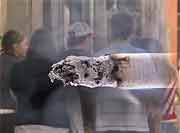Effect strongest for those without other risk factors, but more study needed
WEDNESDAY, Sept. 2, 2015 (HealthDay News) — Exposure to secondhand cigarette smoke during childhood or while in the womb may increase risk of atrial fibrillation in adulthood, new research suggests. The findings were published online Sept. 1 in Heart Rhythm.
Gregory Marcus, M.D., director of clinical research in the division of cardiology at the University of California, San Francisco, and colleagues analyzed survey answers from an ongoing Internet-based study group of 4,976 adults. Twelve percent of them said they had atrial fibrillation. The researchers then took into account the participants’ risk factors for atrial fibrillation.
After considering those factors, the researchers found that adults had 37 percent higher odds of atrial fibrillation if either of their parents smoked while the mother was pregnant. The adults had 40 percent higher odds if they lived with a smoker as a child. Among adults without other risk factors, the link between atrial fibrillation in adulthood with secondhand smoke during pregnancy or childhood was even stronger.
Even though the study can’t prove cause and effect, this greater association in participants without other risk factors “suggests that secondhand smoke may have effects directly relevant to this important arrhythmia,” Marcus told HealthDay.
Marcus disclosed financial ties to SentreHeart, Medtronic, InCarda, and Pfizer.
Copyright © 2015 HealthDay. All rights reserved.








